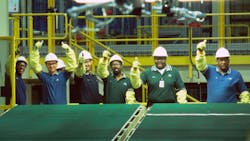WASHINGTON – U.S. manufacturing activity expanded in February for the third month in a row, hitting the highest level since 2011, according to the ISM survey of purchasing managers released Friday.
The Institute for Supply Management's manufacturing sector index rose to 54.2 from 53.1 in January, boosted by a 4.5% surge in new orders.
Manufacturing appeared to be pulling out of a holding pattern in the second half of 2012, when the index hovered around the 50 break-even line between growth and contraction.
The index, based on a nationwide survey of manufacturing purchasing executives, showed across-the-board gains for the second straight month.
"The indictors for new orders, production and backlogs all surged in February from the previous month and most of the report's other indexes of manufacturing activity moved in a favorable direction," noted Daniel Meckstroth, chief economist for the Manufacturers Alliance for Productivity and Innovation (MAPI).
"The Index has been at 54.2 or higher only about one-third of the time over the last 20 years. Clearly, the ISM report for February is very favorable and suggests that manufacturing activity last month was growing at a rapid pace," he added.
The February reading was the highest since June 2011 and unexpectedly strong. Most analysts estimated the index would fall to 52.4.
Gains were seen in all five sub-indexes: new orders, production, employment, supplier deliveries and inventories.
Of the 18 manufacturing industries surveyed, 15 reported growth, compared with 13 in January.
"Overall, the February ISM report suggests strong growth in the upcoming February industrial data," Meckstroth concluded.
He warned that some caution is appropriate, however.
"February may be a euphoric period following the resolution of the fiscal cliff but it precedes the headwinds of sequester and federal shutdown deadlines this month. MAPI expects manufacturing production to increase 2.2% this year, which is slower pace than the 4.2% growth in 2012."
Executive Poll
Executives polled in the survey generally appeared upbeat about demand, although some indicated worry about the government's drastic "sequester" spending cuts that were to begin Friday.
"Overall business is good," said an executive in the food, beverage and tobacco products industry.
A furniture executive said: "Business seems to be on an uptick. The normal seasonal downturn for us has been much shorter and not as severe as in the past four years."
But an executive in computers and electronics pointed to government cuts in defense spending as a problem for his industry, one of the three reporting a contraction in February.
About the Author
IW Staff
Find contact information for the IndustryWeek staff: Contact IndustryWeek
